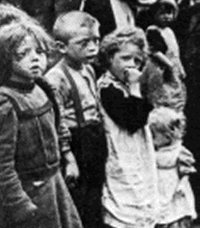Malcolm X: Separation vs. Assimilation
As a human being one lives according to the expectations of other human beings. The rules are set out by the ruling people who inspect and protect the morals and values of the society. Expectations are often based on ancient prejudices and are most easily removed by talking, even though talking is usually out of the question due to uneven relations between the ruled and the ruling. Every once and a while these expectations are being broken for reasons not quite truly known. In viewing the sixties as such a time several important figures can be pointed out as “trend-breakers”.

Malcolm X is one of those people that succeeded in changing mentalities of the big minority of black people in urban ghettoes. These people were suffering under racial injustice. Let me define: unjust treatment by the ruling pure on the grounds of hate and fear, both generated by the prejudice of race. Being treated unfair leaves every human being two options: accept or deny. By accepting the prejudice and these expectations they become truths and one can lose his or her rightiousness. By denying them one is not accepting the contemporary rules of the society and is thus placed outside society. Placing yourself outside the society is challenging the ruling, like a tennisplayer not accepting the decision of the judge on a call of which the player is certain that his play was in bounds. Discarding the activity or passivity of these terms the choice is to be seperated or to be assimilated. This ofcourse is not an announced, preconceived or prepared choice. In the case of Malcolm X it is easy to say that his prison experience made him see that, while being put outside of society, one can find answers in the mind and especially in the free mind. He went on in seeking to convince others to free their minds and choose for another society or nation, as the Nation of Islam propagated itself.
In this essay i will try and seperate three, not two, different Malcolm's along with their motives and backgrounds using his autobiography. After comparing the three stages of his life I will analyse them comparatively and conclude the effects on Malcolm and his environment. When quoting from his autobiographt i will simply add the page between brackets, since this is my biggest source.

The first Malcolm is ofcourse Red. Whether in Detroit, Harlem or Boston, this is a Malcolm that lives in this world, fully accepting his surrounding after finding one which is compatible with his persistant character. He accepts the racial injustice as societies way, but meanwhile he is in need of many exits for his build-up frustrations and hate. His skills are explored and, as he constantly repeats about other criminals in the ghetto and their unused talents (West-Indian Archie should have been a math genius), his talent lies in his charismatic public relations, which usually involve petty crime and trickery. He can read minds, find out what the expectations are of the other person, and act to them. Malcolm the Hustler deals with racial injustice by being unjust to others, thus reflecting the problem to others. The reason for this dishonesty is the type of life malcolm and other black people in the urban ghettoes are forced to live, which is one of survival. I imagine Red was not as aware of other solutions to this racial injustice as propsed by the author, who ofcourse is retelling in retrospective, thus not disconnecting his mind fully. This is demonstrated nicely by the unawareness of the true reason of Young Malcolm putting lye in his hair. “Ashamed of his roots” is the reason given later to this fashionable action.
Yet, if the individual doesn't know, that does not mean that it is not an illness of the black minority in the cities. Another unawareness later build in by the interviewed Malcolm X is the faultness of pork and white women. The young malcom instinctivly was enthusiastic having a white woman, since this was the rulers wife, but he knew nothing of the corrupting effects white women have on black men. I guess one can clearly see the finger of the Nation of Islam in the first few chapters of the book.
Malcolm X, preaching Muhammed's rules on the street to people who just left church is the second Malcolm. In his reaction to racial injustice he is fierce. So fierce that one can argument he is pointing the gun the other way, which in principle is racial injustice aswell. This type of racial injustice is permittable though because it has a lesser edge for it is from the ruled not the ruling and it doesn't carry the pain of centuries old injustice. Malcolm X's mind is fully aware of his rising power, but there is no communication with the hustler's “animal”-instincts. He puts himself in a dangerous position while revealing (to everyone except to himself) true causes of the Nation of Islam. This malcolm X has to act to other morals and values, which instinctivly are not his. The only way to do this is, again, to accept them.
So he fully integrates himself in the Nation, eventually blinding himself. On the external side his growing influence is beautiful and has been a role model for many people. This “in your face”-preaching mentality comes from the will to grow for a cause you believe with all your hart and more. The Nation had to grow, no matter who or what stands in the way. Malcolm in the end sort of regretted this, since it laid on the new 'muslims' no personal religious experience, required to become a muslim.
Al-Hajj is the third Malcolm. This is the truly separated malcolm, for only after separating himself from a repressive or reactive set of morals and values can he evaluate the american situation. Dr. Quispel, who held a lecture about malcolm X described him as becoming more moderate after going te Mecca.
I do not agree with Dr. Quispel. Disconnecting yourself from your protective layer in such an hatefull surrounding is a very radical thing to do. I would say that after both underreacting to racial injustice and after overreacting to it Malcolm is finally balanced. Discovering the true islam also taught him the necessity to disconnect spiritual matters from wordly matters.

Many charactaristics of Red and Malcolm are combined for the better in Al-Hajj. While Red trusts only the people in heis close-mouthed circle, Malcolm trusts all people of equal color who lay themselves before allah, or preferably Elijah Muhammed. Al-Hajj trusts reasonable people who think about justice and truth without considering the expectations. As I now return to the beginning of this essay it needs to be said that Malcolm X, a giant in opening up minds, is still not fully understood in his doing. I would like to conclude with Malcolm's own words which confirm my essay: "I'm for truth, no matter who tells it. I'm for Justice, no matter who it is for or against. I'm a human being first and foremost and as such I'm for whoever and whatever benefits humanity...as a whole!"









 It was after the Gulf War that his mother and boyfriend at the time decided to 'descend' from the Holy land and set sail towards The Hague, being the birthplace of Even-Zohars
mother. Jonathan managed well in Grade school and High school, so the
next logical step was the University, the infinite source of knowledge.
After speculating on Industrial Design, Social Geography and Journalism
it was the study of History at Leiden that turned out to be his
decision.
It was after the Gulf War that his mother and boyfriend at the time decided to 'descend' from the Holy land and set sail towards The Hague, being the birthplace of Even-Zohars
mother. Jonathan managed well in Grade school and High school, so the
next logical step was the University, the infinite source of knowledge.
After speculating on Industrial Design, Social Geography and Journalism
it was the study of History at Leiden that turned out to be his
decision.
 Now, four years into the study, matters have only become more
complicated as this student advances towards World History; meaning the
complete array of fields a historian may implement in explaining the
entire past of the entire world to fellow men. It is especially the
philosophical character of World History that attracted Jonathan.
Now, four years into the study, matters have only become more
complicated as this student advances towards World History; meaning the
complete array of fields a historian may implement in explaining the
entire past of the entire world to fellow men. It is especially the
philosophical character of World History that attracted Jonathan.
 For him there is only one question that stands above all others like a
lonely chuchtower in some Flemish village, which asks the cause of the
Western Rise and the Industrial Revolution. Furthermore, the role of the
European self- and worldimage throughout its history may explain the
role of Europe in the Eurasian Human Web. Thus, the direct contact
between Islam and Christianity is to be investigated. Were Muslims
constantly on the verge of invading Europe? How did Arab people perceive
the 'barbaric' Christians? How was Science spread and how did the West
pick up knowledge form the Arabs or from further East? Europe and the
Islam are still not at peace, certainly not in the mind.
For him there is only one question that stands above all others like a
lonely chuchtower in some Flemish village, which asks the cause of the
Western Rise and the Industrial Revolution. Furthermore, the role of the
European self- and worldimage throughout its history may explain the
role of Europe in the Eurasian Human Web. Thus, the direct contact
between Islam and Christianity is to be investigated. Were Muslims
constantly on the verge of invading Europe? How did Arab people perceive
the 'barbaric' Christians? How was Science spread and how did the West
pick up knowledge form the Arabs or from further East? Europe and the
Islam are still not at peace, certainly not in the mind.